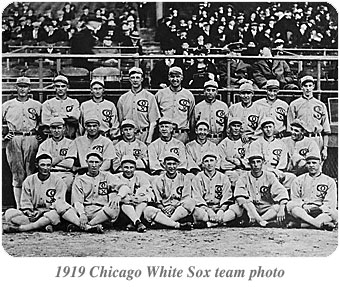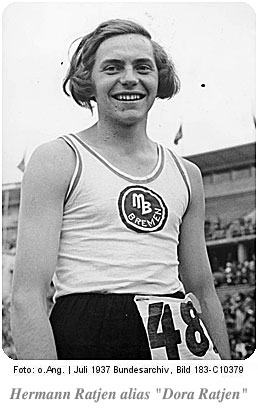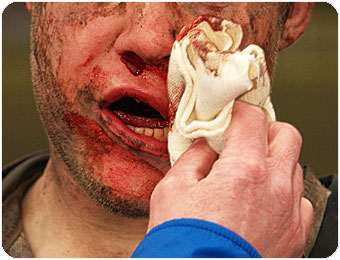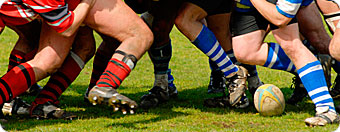FEATURE ARTICLE -
Issue 38 Articles, Issue 38: Nov 2009
There are many things in this world that I do not understand but I suspect that, aside from quantum physics, the thing I understand least is a passionate and overpowering commitment to sport of any denomination (and I use that word advisedly). In the greater scheme of things I simply cannot see that it matters all that much who wins the grand final or most medals in the Olympics. Yet otherwise ostensibly sane human beings have allowed sport, either the playing of or involvement in, to consume their lives. I have absolutely nothing upon which to base this other than my own (many would say jaundiced) experience, but it does seem to me that sport takes up more than its fair share of newspaper column space, television time and dinner party conversation. As for the amount of money paid to professional sports people — that simply doesn’t bear thinking about.
 Sport, to those of us who do not indulge, appears to be simply a quick and easy way to sustain bodily injury of a greater or lesser degree. On any weekend, in hospital emergency departments everywhere there are vast queues of people with broken or bloodied body parts listening to a tired and disgruntled nurse saying “There are people in here who are really sick. Your injury is self inflicted. You can cut you own smelly socks/shirt/shorts off, I haven’t got the time. If you’re lucky the doctor will be here in about five and a half hours.” (I pause here to say that, in this respect, the “easy tearing” rugby shirt introduced in the 2006 Rugby World Cup was not only a welcome relief to women around the world, but to the medical profession as well.)
Sport, to those of us who do not indulge, appears to be simply a quick and easy way to sustain bodily injury of a greater or lesser degree. On any weekend, in hospital emergency departments everywhere there are vast queues of people with broken or bloodied body parts listening to a tired and disgruntled nurse saying “There are people in here who are really sick. Your injury is self inflicted. You can cut you own smelly socks/shirt/shorts off, I haven’t got the time. If you’re lucky the doctor will be here in about five and a half hours.” (I pause here to say that, in this respect, the “easy tearing” rugby shirt introduced in the 2006 Rugby World Cup was not only a welcome relief to women around the world, but to the medical profession as well.)
Despite the obvious dangers people keep playing sport. In every city in every country of the developed world there are orthopaedic surgeons with multi-million dollar property portfolios, serious car habits and several ex-spouses supported entirely by people who play sport less well than they thought they could.
 However, risking physical injuries that can only be repaired by the insertion of the medical equivalent of an internal meccano set is not the only way to let sport ruin your life. For some the all consuming desire to win or the single minded pursuit of the fame and money that comes with it leads to decisions of such monumental stupidity one can only stand back and ponder: “What did you think was going to happen you fool?” The examples of people who fall into this category are legion. For those who are interested there is an excellent list of the top 25 at “espn.com”.1 However, in the “life ruining” category special mention should be made of Tonia Harding and her Detroit Bone Crushers2, Hansie Cronje, the South African cricketer, and the 1919 Chicago White Sox all of whom, like Cronje, were found to have accepted money to fix matches and banned from playing their chosen sport for life. At least “Shoeless” Joe Jackson got to come back from the dead and play baseball with Burt Lancaster in Kevin Costner’s back yard.3 My personal favourite, though, is Hermann Ratjen who, in 1936, was told to tuck in his wedding tackle and high jump for the Fatherland on the girls’ team, only to get beaten by three real girls. Herr Ratjen was last seen working as a waiter in Hamberg.
However, risking physical injuries that can only be repaired by the insertion of the medical equivalent of an internal meccano set is not the only way to let sport ruin your life. For some the all consuming desire to win or the single minded pursuit of the fame and money that comes with it leads to decisions of such monumental stupidity one can only stand back and ponder: “What did you think was going to happen you fool?” The examples of people who fall into this category are legion. For those who are interested there is an excellent list of the top 25 at “espn.com”.1 However, in the “life ruining” category special mention should be made of Tonia Harding and her Detroit Bone Crushers2, Hansie Cronje, the South African cricketer, and the 1919 Chicago White Sox all of whom, like Cronje, were found to have accepted money to fix matches and banned from playing their chosen sport for life. At least “Shoeless” Joe Jackson got to come back from the dead and play baseball with Burt Lancaster in Kevin Costner’s back yard.3 My personal favourite, though, is Hermann Ratjen who, in 1936, was told to tuck in his wedding tackle and high jump for the Fatherland on the girls’ team, only to get beaten by three real girls. Herr Ratjen was last seen working as a waiter in Hamberg.
Usually, the culprits for these life ruining activities are the players themselves or their coaches and managers. However, a recent case in England, which has predictably become known as “Bloodgate”, establishes that you do not have to play sport or be involved in its administration for it to well and truly ruin your life.
The story so far is this. Tom Williams was playing winger for the Harlequins against Leinster in the Heineken Cup last season. (I pause again to say that I do not know what any of those terms mean except Heineken but I do not think my experience of a Heineken cup is the same as Tom’s). Apparently things were going quite poorly for the Harlequins and they decided what was really needed was a field goal specialist. So Tom, having had the prescience to supply himself with one regulation joke shop blood capsule, unceremoniously popped said capsule in his mouth, broke it and not surprisingly was sent off the field looking like an extra from Twilight — enter Mr Drop Goal who, by the way, had a day job playing for the All Blacks. (Another pause to wonder how one conceals a blood capsule on one’s person while playing a game of rugby without either losing it in one’s foundation garments or choking on it?)
 Tom’s undoing was due to the point I make above about sport taking up too much time on television, for indeed the match was televised. Poor Tom’s gory appearance was considered interest worthy and he was filmed as he came off the field at which time he winked, presumably to Mr Drop Goal but no-one is certain. The Leinster team doctor noticed this wink and, quite rightly, became suspicious. He asked to inspect the wound. Tom became concerned because he didn’t in fact have a wound.
Tom’s undoing was due to the point I make above about sport taking up too much time on television, for indeed the match was televised. Poor Tom’s gory appearance was considered interest worthy and he was filmed as he came off the field at which time he winked, presumably to Mr Drop Goal but no-one is certain. The Leinster team doctor noticed this wink and, quite rightly, became suspicious. He asked to inspect the wound. Tom became concerned because he didn’t in fact have a wound.
What happened next remains subject to some uncertainty. There was a meeting in the team dressing room during which Tom’s lack of a wound was discussed. Present at the meeting were the team manager, Dean Richards, the team physiotherapist, Steph Brennan and the team doctor, Dr Wendy Chapman. What we can be sure of is that Williams, Richards and Brennan have all ‘fessed up planning the fake blood injury and have been suspended from being involved in rugby for varying lengths of time.
Dr Chapman’s alleged involvement is, if true, of a far more serious and, to any sensible person, baffling nature. Tom Williams has made a statement saying that, concerned that he would be caught cheating, he asked Dr Chapman to actually cut his lip. And here’s the baffling bit — he says she did. Thankfully she then patched up the wound. Dr Chapman, who is an emergency medicine consultant employed by the Maidstone and Tunbridge Wells NHS Trust was suspended from medical practice in mid September pending investigations by the General Medical Council (GMC) which is the UK equivalent of the Medical Board. The GMC has not released details of the matters under investigation but says they are serious enough to warrant suspension.
Having discussed this case with a number of rugby fans I was genuinely surprised that all of them thought that Dr Chapman’s alleged offence was assisting her team to cheat. Not one of them, until prompted, considered the outrage of a medical practitioner potentially guilty of intentionally inflicting an injury, no matter how minor, for no clinical purpose. If the GMC is investigating Dr Chapman’s involvement in Bloodgate that would almost certainly be its primary focus. If Dr Chapman has intentionally wounded the player, even at his request, it would breach the first principle of the Hippocratic Oath: “First do no harm”.
The GMC has the power to suspend or withdraw a doctor’s registration if the doctor is regarded as “impaired” which includes a doctor guilty of “misconduct” or “deficient professional performance”.4 The terms are not defined in the UK legislation. In Queensland, doctors can be disciplined if guilty of “unsatisfactory professional conduct” which is defined to include:
(a) professional conduct that is of a lesser standard than that which might reasonably be expected by the public or professional peers;
(b) professional conduct that demonstrates incompetence, or a lack of adequate knowledge, skill, judgment or care, in the practise of the registrant’s profession;
(c) infamous conduct in a professional respect;
(d) misconduct in a professional respect;
(e) conduct discreditable to the profession;
(f) providing a person with health services of a kind that are excessive, unnecessary or not reasonably required for the person’s wellbeing;
(g) influencing, or attempting to influence, the conduct of another registrant in a way that may compromise patient care;
(h) fraudulent or dishonest behaviour in the practise of the registrant’s profession; and
(i) other improper or unethical conduct.5
I would suggest that in Queensland, any doctor intentionally injuring a person in the circumstances alleged against Dr Chapman would risk falling into all but one or two of those categories.
In his statement, Tom Williams said that Dr Chapman was “not happy” about his request to cut his lip and that she “expressed concern about the potential impact on her career”. If this is a true reflection of what occurred, Dr Chapman should have expressed more than concern. She should have expressed a good firm “No” and perhaps then she would not be facing, at the very least, the prospect of a ruined career. Because here’s the thing: Why on God’s green and pleasant earth would any sane person chuck in a perfectly decent medical career to protect a bunch of blokes who cheat at rugby specifically in order to get an All Black on the field? It beggars belief.
The moral of the story is of course, that no matter how much enjoyment we get out of sport, either watching or playing, no matter how rich and famous sports men and women become, and no matter how huge the revenues from broadcast rights and associated advertising, at the end of the day it’s only a game!
Patricia Feeney
Footnotes
- Aaron Kuriloff “25 Great Hoaxes, Cheats and Frauds in Sport” 17 April 2005
- Tonia Harding was a figure skater who pleaded guilty to conspiring with her husband in 1994 to arrange an assault on her rival Nancy Kerrigan.
- “Field of Dreams”
- Medical Act 1983(UK) section 35C
- Health Practitioners (Professional Standards) Act 1999 Schedule Dictionary




 Sport, to those of us who do not indulge, appears to be simply a quick and easy way to sustain bodily injury of a greater or lesser degree. On any weekend, in hospital emergency departments everywhere there are vast queues of people with broken or bloodied body parts listening to a tired and disgruntled nurse saying “There are people in here who are really sick. Your injury is self inflicted. You can cut you own smelly socks/shirt/shorts off, I haven’t got the time. If you’re lucky the doctor will be here in about five and a half hours.” (I pause here to say that, in this respect, the “easy tearing” rugby shirt introduced in the 2006 Rugby World Cup was not only a welcome relief to women around the world, but to the medical profession as well.)
Sport, to those of us who do not indulge, appears to be simply a quick and easy way to sustain bodily injury of a greater or lesser degree. On any weekend, in hospital emergency departments everywhere there are vast queues of people with broken or bloodied body parts listening to a tired and disgruntled nurse saying “There are people in here who are really sick. Your injury is self inflicted. You can cut you own smelly socks/shirt/shorts off, I haven’t got the time. If you’re lucky the doctor will be here in about five and a half hours.” (I pause here to say that, in this respect, the “easy tearing” rugby shirt introduced in the 2006 Rugby World Cup was not only a welcome relief to women around the world, but to the medical profession as well.)  However, risking physical injuries that can only be repaired by the insertion of the medical equivalent of an internal meccano set is not the only way to let sport ruin your life. For some the all consuming desire to win or the single minded pursuit of the fame and money that comes with it leads to decisions of such monumental stupidity one can only stand back and ponder: “What did you think was going to happen you fool?” The examples of people who fall into this category are legion. For those who are interested there is an excellent list of the top 25 at “espn.com”.1 However, in the “life ruining” category special mention should be made of Tonia Harding and her Detroit Bone Crushers2, Hansie Cronje, the South African cricketer, and the 1919 Chicago White Sox all of whom, like Cronje, were found to have accepted money to fix matches and banned from playing their chosen sport for life. At least “Shoeless” Joe Jackson got to come back from the dead and play baseball with Burt Lancaster in Kevin Costner’s back yard.3 My personal favourite, though, is Hermann Ratjen who, in 1936, was told to tuck in his wedding tackle and high jump for the Fatherland on the girls’ team, only to get beaten by three real girls. Herr Ratjen was last seen working as a waiter in Hamberg.
However, risking physical injuries that can only be repaired by the insertion of the medical equivalent of an internal meccano set is not the only way to let sport ruin your life. For some the all consuming desire to win or the single minded pursuit of the fame and money that comes with it leads to decisions of such monumental stupidity one can only stand back and ponder: “What did you think was going to happen you fool?” The examples of people who fall into this category are legion. For those who are interested there is an excellent list of the top 25 at “espn.com”.1 However, in the “life ruining” category special mention should be made of Tonia Harding and her Detroit Bone Crushers2, Hansie Cronje, the South African cricketer, and the 1919 Chicago White Sox all of whom, like Cronje, were found to have accepted money to fix matches and banned from playing their chosen sport for life. At least “Shoeless” Joe Jackson got to come back from the dead and play baseball with Burt Lancaster in Kevin Costner’s back yard.3 My personal favourite, though, is Hermann Ratjen who, in 1936, was told to tuck in his wedding tackle and high jump for the Fatherland on the girls’ team, only to get beaten by three real girls. Herr Ratjen was last seen working as a waiter in Hamberg. Tom’s undoing was due to the point I make above about sport taking up too much time on television, for indeed the match was televised. Poor Tom’s gory appearance was considered interest worthy and he was filmed as he came off the field at which time he winked, presumably to Mr Drop Goal but no-one is certain. The Leinster team doctor noticed this wink and, quite rightly, became suspicious. He asked to inspect the wound. Tom became concerned because he didn’t in fact have a wound.
Tom’s undoing was due to the point I make above about sport taking up too much time on television, for indeed the match was televised. Poor Tom’s gory appearance was considered interest worthy and he was filmed as he came off the field at which time he winked, presumably to Mr Drop Goal but no-one is certain. The Leinster team doctor noticed this wink and, quite rightly, became suspicious. He asked to inspect the wound. Tom became concerned because he didn’t in fact have a wound.